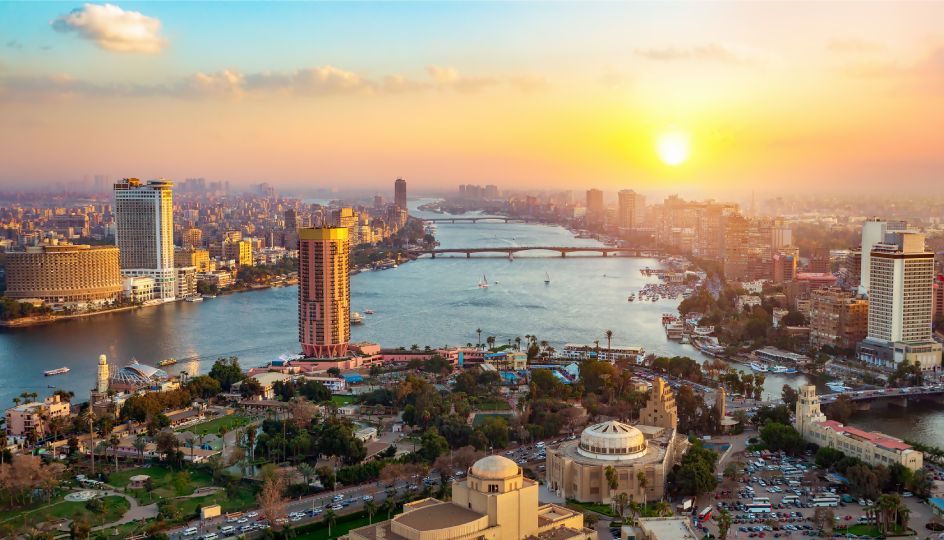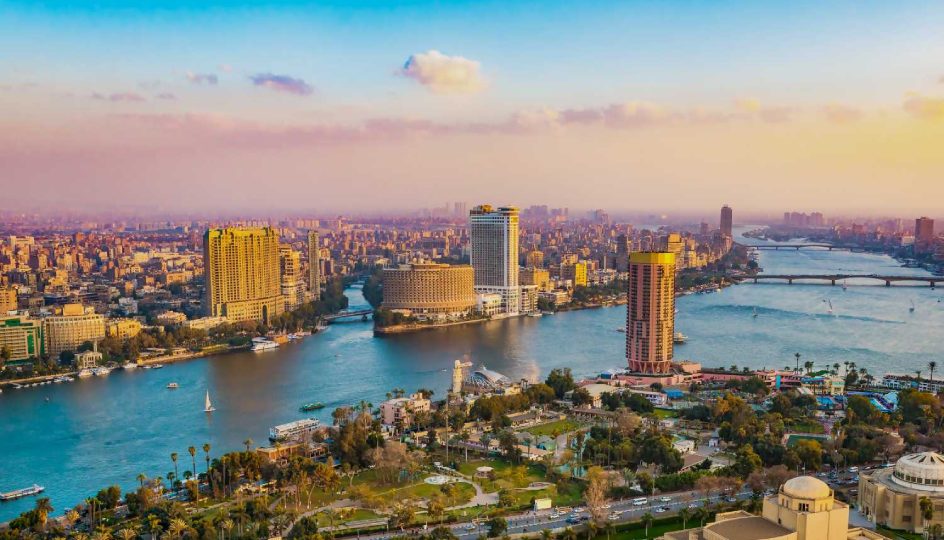Reasons to do business in Egypt: a vibrant hub for investment

In just a few years, Egypt has transformed itself from a nation struggling with political and civil unrest into a rapidly growing economy which is a hub for businesses across the Middle East and North Africa. There are investment opportunities in a variety of sectors, attracting interest from around the world. However, the business environment remains complex and companies should seek the advice of local experts before entering the market.
Positive outlook supported by foreign direct investment and infrastructure spending
Egypt offers huge potential for companies seeking to expand beyond the developed, mature markets of the northern hemisphere. Its population of 100 million is rising by about 2 million people a year. It has the third largest economy in the region after Saudi Arabia and Israel, and it was one of the only economies in the world, along with China, that continued growing during the Covid-19 pandemic.
Egypt’s GDP grew by 3.6% in 2020 and 3.3% in 2021, while the pace of growth is expected to surpass 5% in 2022 and remain strong in the coming years.
Egypt is the one the region’s largest recipients of FDI (foreign direct investment), which is attracted by Egypt’s enormous domestic market, strong GDP growth, strategic geographical position, and large and educated talent pool. In addition, the government, with the support of the International Monetary Fund (IMF) and the World Bank, has been investing heavily in public infrastructure. Roads, railways and ports have been upgraded, and a nation once dogged by regular power blackouts is now exporting energy to Sudan, Syria, Cyprus and Greece. The recently commissioned BenBan Solar Park, the world’s fourth largest solar power plant, with a total capacity of 1650MW, will make a significant contribution to Egypt’s transition to renewable energy.
Construction is also booming, thanks in large part to the government’s decision to build 20 fourth generation new cities. They include New Cairo, New Obour City, New Alamein City, New Mansoura City, and the New Administrative Capital. The administrative capital will be built 50km to the east of Cairo on an area of 170,000 feddansa (1 feddan= 4,200.833 square metres). When those cities are completed they are expected to accommodate around 30 million people and provide millions of jobs, while significantly easing congestion in heavily populated Cairo.
Improved security is also helping to attract investment and tourism
Only a few years ago, security concerns tarnished Egypt’s allure as a destination for many investors and tourists. However the situation has improved significantly in recent years. The government has stepped up security measures, which have improved personal safety and ensured that Egypt’s crime rate is now relatively low.
This welcome development has greatly improved Egypt’s international profile as a safe and appealing destination for both business travellers and tourists. The country hosts many major international events and conferences, and will this year welcome the participants of COP27, the United Nations’ Climate Change Conference, which will be held in Sharm El-Sheikh. However, there are still some areas of the country, such as North Sinai and the Western Desert, that should still be avoided.
Government keen to liberalise and improve the local business environment
The Egyptian government is adding to the country’s appeal as an investment destination by making significant efforts to open the economy. In 2016, it implemented a programme of structural reforms, supported by the IMF, aimed at improving Egypt’s international competitiveness. Key measures included the adoption of a flexible and more liberal exchange rate regime. A new Investment Law was introduced the following year, with the aim of reducing barriers to entry for international companies and streamlining the startup process. The law also included new safeguards to enhance investor confidence - foreign investors and Egyptian nationals are now treated equally under the law and foreigners have the right to transfer profits abroad.
The government is also reforming the local tax and regulatory environment. The VAT (value-added tax) regime has been simplified, and mandatory e-invoicing was introduced in February this year. This move is expected to improve the efficiency and reduce the cost of invoicing, while also limiting scope for tax evasion.
There are still significant challenges
In response to the many opportunities offered by Egypt, and the government’s reform agenda, many more multinational corporations are showing interest in establishing operations in the country. However, there are still significant challenges to establishing a business in the country. Despite recent reforms, the tax and regulatory environment remains much more complex than in other countries within the region. For example, Egypt has many different forms of taxation, and companies must file separate returns for corporation and property taxes and stamp duty. The country’s labour laws and its social security system are also complicated, and dealings with the administrative authorities are further hampered by the fact that Arabic is the sole language used in official government portals for tax, social insurance, customs and the commercial register.
TMF Group in Egypt
Companies considering entering the Egyptian market would therefore be well-advised to seek advice from experienced, local specialists before embarking on their venture, as missteps early in the business startup process are difficult, expensive and time consuming to fix when the entity has been established.
TMF Group operates in 85 jurisdictions around the world. It employs more than 9,000 experts, qualified in areas such as legal, accounting, HR and payroll. In Egypt, TMF Group’s multilingual, internationally experienced team has been helping companies with all aspects of their Egyptian operations. Our clients come from a wide variety of industries, including manufacturing, e-commerce, and call centre operators. We aim to provide them with a single port of call, offering support with initial incorporation and licensing processes, office accommodation and access to banking services. When up and running we assist with accounting, bookkeeping, taxation and regulatory filings, payroll calculations and all other aspects of entity management.
Contact us to learn more about how TMF can help your company access and thrive in this vibrant and growing market at the gateway of the Middle East.




